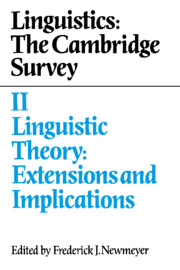Book contents
- Frontmatter
- Contents
- Contributors
- Preface
- 1 Extensions and implications of linguistic theory: an overview
- 2 Grammar and language processing
- 3 Grammatical principles of first language acquisition: theory and evidence
- 4 Second language acquisition and grammatical theory
- 5 Brain structures and linguistic capacity
- 6 Abnormal language acquisition and the modularity of language
- 7 Grammatical aspects of speech errors
- 8 Grammar and conversational principles
- 9 Discourse analysis: a part of the study of linguistic competence
- 10 Speech act distinctions in grammar
- 11 Computer applications of linguistic theory
- 12 Metrics and phonological theory
- 13 Grammatical theory and signed languages
- 14 The linguistic status of creole languages: two perspectives
- 14.I Creole languages and the bioprogram
- 14.II Are creoles a special type of language?
- 14.III A dialog concerning the linguistic status of creole languages
- Subject index
- Name index
- Contents of volumes I, III, and IV
14 - The linguistic status of creole languages: two perspectives
Published online by Cambridge University Press: 08 February 2010
- Frontmatter
- Contents
- Contributors
- Preface
- 1 Extensions and implications of linguistic theory: an overview
- 2 Grammar and language processing
- 3 Grammatical principles of first language acquisition: theory and evidence
- 4 Second language acquisition and grammatical theory
- 5 Brain structures and linguistic capacity
- 6 Abnormal language acquisition and the modularity of language
- 7 Grammatical aspects of speech errors
- 8 Grammar and conversational principles
- 9 Discourse analysis: a part of the study of linguistic competence
- 10 Speech act distinctions in grammar
- 11 Computer applications of linguistic theory
- 12 Metrics and phonological theory
- 13 Grammatical theory and signed languages
- 14 The linguistic status of creole languages: two perspectives
- 14.I Creole languages and the bioprogram
- 14.II Are creoles a special type of language?
- 14.III A dialog concerning the linguistic status of creole languages
- Subject index
- Name index
- Contents of volumes I, III, and IV
Summary
The linguistic status of creole languages is such a controversial issue that it seems reasonable to devote two contributions to the topic in this volume. While both take for granted the basic conceptions of generative grammar, they could not differ more in their conclusions. Derek Bickerton, in his ‘Creole languages and the bioprogram’ (Chapter 14.1), develops further the hypothesis with which he has long been associated, namely that Creoles provide the most direct window possible into the properties of universal grammar. For Bickerton, such languages point directly to our biological capacity to recreate language should the normal generation-to-generation means for doing so break down. Pieter Muysken's ‘Are Creoles a special type of language?’ (Chapter 14.11), however, questions whether the notion ‘creole language’ is anything more than a sociological epiphenomenon, devoid of special significance to grammatical theory. In Chapter 14.111, ‘A dialogue concerning the linguistic status of creole languages,’ Bickerton and Muysken engage in a spirited confrontation, challenging the conclusions of each other's chapters.
- Type
- Chapter
- Information
- Linguistics: The Cambridge Survey , pp. 267Publisher: Cambridge University PressPrint publication year: 1988
- 1
- Cited by



